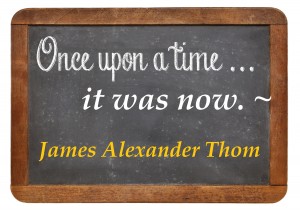by @ AnnieDaylon
Looking for a great tip for writing historical fiction?
Try this: “Once upon a time, it was now.”
I found this pearl of wisdom in The Art and Craft of Writing Historical Fiction by successful historical fiction author, James Alexander Thom. Thom sees this concept as most effective for storytelling and has adopted it as his credo. The author, Thom says, must write as if everything is happening now, with no thought about future. He further explains:
-
“Today is now.
-
Yesterday was now.
-
Tomorrow will be now.”
How do authors of historical fiction make any time now? By taking the reader there, into that exact time.
For me, this means that authors must provide not only authentic historical details, but also authentic character reactions. Yes, the authors know the future. Yes, the readers know the future. But the characters know nothing of the future. Authors must make readers so enmeshed that they forget the future, that they are there, now, with the characters, looking forward, experiencing the same emotions, reactions, and uncertainty the characters do.
I am in the editing process of Book I of a trilogy which is set on the island of Newfoundland, one hundred years ago and the phrase “Once upon a time, it was now” is never far from my mind. I am determined that my ‘once upon a time’ will be a now.
Many thanks to James Alexander Thom! 🙂
Do you have a favorite tip for writing historical fiction (or any other genre?) If so, please send it along!
Please subscribe to my Author Newsletter by including your first name and email address in the space provided on the right. Many thanks!
My best to you,



Wow – thanks for sharing this nugget of mantra wisdom. It’s amazing how just a few key words can take your brain to the place where you need to be when you write. I do not presently write historical fiction, but this can really apply to any kind of story. What we want to do is put the reader into the heads of our characters – if we make it NOW, they’re there.
Thanks for this great tip!
You’re welcome!
This ‘nugget’ does stick with you, doesn’t it? Loved it. Had to share it. So glad you find it helpful, too.
Cheers,
Annie
Great advice. I’ve written several historical novels about Leonardo da Vinci and have always tried to make the setting come alive to readers, but it’s good to be reminded. My current novel-in-progress is set in and out of the Biltmore. And that’s exactly what I want the reader to feel – like they are a visitor there during the height of the Golden Age.
Hi, Catherine,
Thanks for stopping by.
I just visited your site: what an impressive list of educational resources! All that and historical novels, too??! Oh, the research… it’s mindboggling.
Glad you liked the post. I loved that “once upon a time” phrase; when I find something that good, I simply have to share it. 🙂
Cheers,
Annie
Hi Annie: I’m a writer, editor and publisher, and I fully embrace this advice. Actually, when creating narratives, I write in the now all the time, as opposed to writing in the past. I use the simple past tense as if it’s the present tense. I think it’s much more dynamic, and, as you have suggested, gives the reader a sense of immediacy.
Hi, Maggie,
Glad you enjoyed the post. I am intrigued by your phrase “use the simple past tense as if it’s the present tense.” Will ponder/apply that as I continue my journey into the world of historical fiction. Thanks so much for stopping by.
Cheers,
Annie
Dear Annie,
Once again, thank you for sharing so many interesting posts with the rest of us ardent scribblers. I always enjoy your content and often pass items on to others on my lists.
Ben Nuttall-Smith
President
Federation of BC Writers
http://bcwriters.ca
Hi, Ben,
Great that you enjoy the posts. Thanks for sharing them.
Received my Postscript(www.bcrta.com) magazine yesterday. Was delighted to find two articles by none other than Ben Nuttall-Smith. Loved your “Letter from and Octogenarian.” Great info in the “Perils of Self Publishing.” Well done! 🙂
Cheers,
Annie
Annie, thanks for this. It does help me in this phase of my memoir. As you know, I am talking to my grandmother, keeping her up to date on my present and past struggles as I remember/imagine hers. So I guess I am employing some historical/literary fiction devices.
Remembering her in the ‘now’ is immensely helpful. I look forward to reading your trilogy.
I love to read the other contributions to your blog — don’t feel so alone in my endeavor.
Keep creative and carry on:-))
Hi, Mary,
You are most welcome. I appreciate knowing that the post is useful for your memoir. Love sharing with, hearing from, other writers. Thanks so much for stopping by!
Cheers,
Annie
excellent bit of info…. I try to do this in my historical fiction, and do it pretty well….. I can be hard knowing the future!!!!!!
Hi, Debra,
Another historical fiction writer! Delighted to hear from you and glad you liked the post.
Best of luck with shaping your “diamond in the rough” novel. (I read your Linked In profile.)
Cheers,
Annie
Hi Annie,
I finished the first book in a trilogy of historical novels set in 19th Century Kansas and then moving to 19th Century Asia, where I was a foreign correspondent. In any case, thought you might enjoy my take on writing historical novels. I wrote a piece on my blog about it. Here is a link: http://j-hawker.blogspot.com/2014/04/the-challenges-of-writing-historical.html.
I just subscribed to your blog.
Bests,
Ron Yates
Hi, Ron,
I read your post and immediately scheduled it on Tweetdeck (tomorrow, 6:46 a.m. Pacific.) A superb piece; love the clear-cut confident way you express your ideas. Thank you so much for sharing!
Best,
Annie